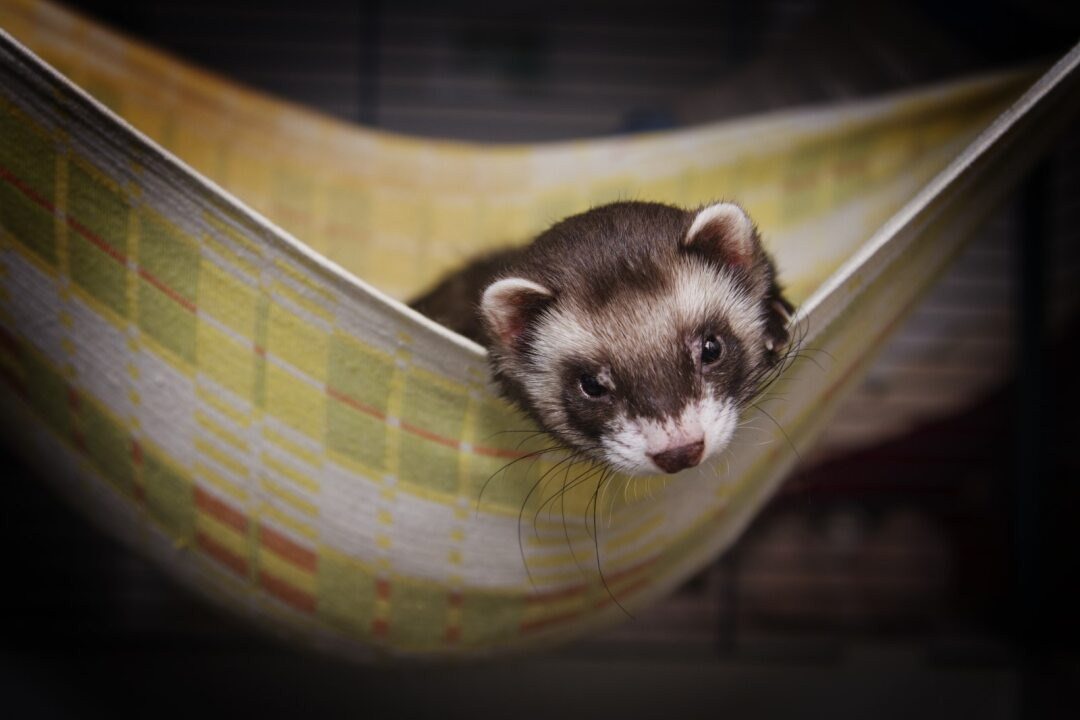
Ferrets are curious and intelligent creatures. While this makes them both fun and entertaining companions, it can also lead them into trouble.
Ferrets will explore every nook and cranny in their environment, pick up any object they find (and often swallow it), chew on anything they can fit into their mouth, and curl up for a nap in the most unlikely places.
This means that you not only have to do your best to ferret-proof your house, but you also need to supervise them when they are out of their enclosure.
So, what things do you need to think about when wondering how to keep your ferrets safe?
What potential dangers are there in the house itself?
- Open doors/doors with gaps
- Windows
- Cabinets
- Open railings on steps and verandas
- Air conditioning ducts
- Electrical wires
Things in the house that might be hazardous to your ferrets
- Appliances (washers, dryers, stoves, refrigerators)
- Houseplants
- Rugs and mattresses
- Water – sinks, bathrooms, toilets, pools
- Spongy, chewable objects (balloons, erasers, foam, rubber bands, buttons)
- Poisons and chemicals
- Medications – medications for other pets and human medications including human oral contraceptives
- Fumes (e.g., from the kitchen, cleaning products, household chemicals, cars)
Other potential dangers to your ferrets
- Temperature extremes (especially heat – ferrets do not tolerate hot days very well and are prone to heat stress on days over 25°C – 30°C).
- Children
- Visitors
- Other pets
Things you can do to help keep your ferrets safe include:
- Make sure all doors and windows are closed securely when your ferrets are out and about
- Make sure all hiding places are closed – cupboards, appliances, etc.
- Keep your ferrets away from steps and verandas
- Place wire protectors over electrical cords
- Close the toilet lid, empty the sinks and bathtubs
- Make sure that your ferrets’ water is changed daily and does not become contaminated
- Keep rubbish off the floor and remember that ferrets are good at opening garbage containers
- Only keep non-toxic plants in your house and remember – if you decide to keep them out of reach, ferrets are good climbers!
- Keep any chemicals and poisons in a locked cupboard. Avoid using poisons such as rodent baits. See this article on the most humane ways to kill pest rats and mice
- Keep any medications well out of reach of your ferrets
- Keep your ferrets out of the kitchen
At the end of the day, the best way to keep your ferrets safe is to supervise them at all times while they are out of their enclosure.
It also doesn’t hurt to think like a ferret at times!
References
RSPCA UK (2023) Common ferret poisons. Accessed 7 Jul 2023
Karr-Lilienthal L, Points K (2019) Ferret Household Hazards. In: USDA National Institute of Food and Agriculture. Accessed 7 Jul 2023
RSPCA UK (2023) Ferrets. Accessed 7 Jul 2023
Meredith A (2016) Ferret behaviour, housing and husbandry. In: Johnson-Delaney C (ed) Ferret Medicine and Surgery. CRC Press, pp 31–46
